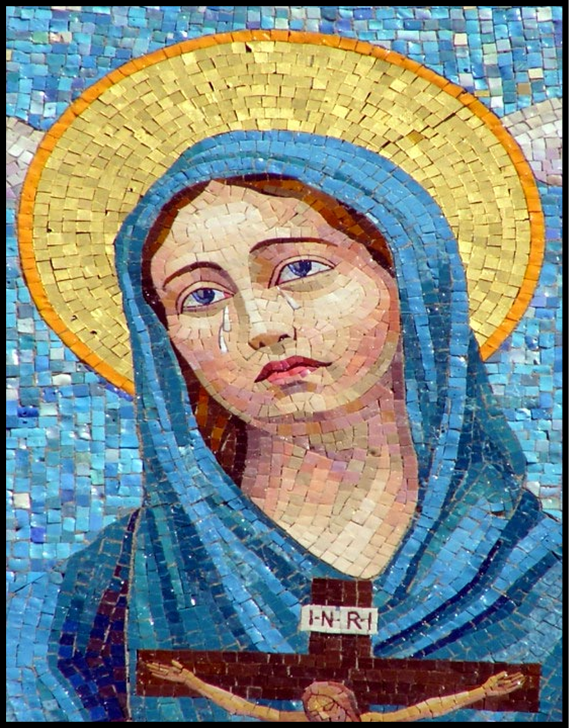Below are some events sponsored by the Evangelization Team
 |
“Renewing Our Faith” A Lenten Journey: is a
5 part series that reflects back on the basics
of our faith. The night consists of music,
presentations, and small group faith sharing.
The series are held during Lent.
Listen to
Brandon Vogt’s presentation on “How the Mass
Makes Life More Meaningful, A parishioner’s
perspective”
Listen to Larann Wilson’s
presentation on “The Church and Me”
Download the
Small Group Discussion Questions |
 |
XLT events:
are
uplifting, intergenerational nights of Praise & Worship music, Inspirational
Talks, Eucharistic Adoration, and Fellowship. These wonderful events are
open to people of all ages, faith and culture. Events are held from 7-9PM
in the Church. The next event is in
July! Stay tuned for more details.
“My soul eXaLTs the Lord and my spirit
rejoices in God my Savior.” Luke 1:45
|
 |
Tear Drops Prayer Service:
is an evening of
reflection and prayer for our family members,
friends and co-workers who have become inactive
in their Catholic faith. Evenings of reflection
and prayer are held three times in the year and
open to all! In the 4th century, St. Monica
prayed for her son’s conversion. St. Augustine
of Hippo became a great Bishop, Founder of a
Religious Order, Saint, and Doctor of the
Catholic Church. May St. Monica intercede for
us as we pray for our loved ones��� return to the
Church. |
|
The primary mission of the Church is to make disciples.
Everything we do is
Evangelization (making disciples).
New Evangelization
“It is like a mustard seed that, when it is sown in the ground, is the smallest of
all the seeds on the earth. But once it is sown, it springs up and becomes the largest
of plants and puts forth large branches, so that the birds of the sky can dwell in its
shade.” Mk 4:31-32
Lord, open my eyes, that I might see the needs of others,
Open my ears, that I might hear your call of discipleship,
Open my heart, that I might love without prejudice,
Open my mouth, that I might share the Good News.
Guide the Church of St. Mary Magdalen with your grace,
Enlighten us with your Word, and
Strengthen us to be Disciples in Mission. Amen.
Pope Benedict VXI on the New Evangelization
To evangelize means: to show this path toward
happiness—to teach the art of living. At the beginning
of his public life Jesus says: I have come to evangelize
the poor (Luke 4:18); this means: I have the response to
your fundamental question; I will show you the path of
life, the path toward happiness—rather: I am that path.
The deepest poverty is the inability of joy, the tediousness of a life
considered absurd and contradictory. This poverty is
widespread today, in very different forms in the
materially rich as well as the poor countries. The
inability of joy presupposes and produces the inability
to love, produces jealousy, avarice—all defects that
devastate the life of individuals and of the world.
This is why we are in need of a new evangelization—if the art of living
remains an unknown, nothing else works. But this art is
not the object of a science—this art can only be
communicated by one who has life—he who is the Gospel
personified.
Fr. Robert Barron is a leading Catholic priest and speaker who has given us the
7-part video series “Catholicism.” Watch this video which Fr. Robert Barron explains
the greatest tool for evangelization…JOY!
What is the New Evangelization?
The New Evangelization calls each of us to deepen our faith, believe in the Gospel message
and go forth to proclaim the Gospel. The focus of the New Evangelization calls all Catholics
to be evangelized and then go forth to evangelize. In a special way, the New Evangelization
is focused on 're-proposing' the Gospel to those who have experienced a crisis of faith. Pope
Benedict XVI called for the re-proposing of the Gospel "to those regions awaiting the first
evangelization and to those regions where the roots of Christianity are deep but who have
experienced a serious crisis of faith due to secularization." The New Evangelization invites
each Catholic to renew their relationship with Jesus Christ and his Church.
The New Evangelization offers hope.
Why do we need the New Evangelization?
The New Evangelization offers hope. Jesus grants all
people rest and comfort from the world's burdens (Mt.
11:28) by offering us the hope of salvation and eternal
life. Through the “re-proposing” of the Gospel, the
Church seeks to comfort all those who are burdened. The
New Evangelization offers the gifts of faith, hope, love
and new life in Christ.
The New Evangelization in the United States
The Church in the United States can be likened to the
mustard seed. The Church has been present in the
Americas since the first missionaries arrived in the
15th Century. Over the past five centuries, the Church's
foundation has sprung up and taken root in the U.S.,
spreading her branches and offering shade to the weary.
This can be seen simply by looking at the work of
Catholic Charities on behalf of the poor, the network of
Catholic schools offering education to millions, and the
commitment of U.S. Catholics to the Church's social
justice teachings. However, there is still work to do.
The 2008 Center for Applied Research in the Apostolate
(CARA) study "Sacraments
Today: Belief and Practice Among U.S. Catholics. . .
," provides a glimpse into the beliefs, practices and
attitudes of U.S. Catholics. According to the study,
only 23% of U.S. Catholics regularly attend Mass once a
week, while 77% self-identify as proud to be Catholic.
These statistics point to the need for the New
Evangelization. The seed of the Church is present, but
the message of Jesus Christ needs to be re-sown and
watered for those who have already heard Christ's call,
but who have not been fully evangelized or catechized.
Truly, the seed of Christ's message has taken root and
yielded much fruit in past seasons. In the spirit of
the New Evangelization, it is our hope that the
resources on this page will yield even greater harvests
for Christ in the future so that all people can dwell in
the shade.
For more information on the New Evangelization, go to
http://www.usccb.org/beliefs-and-teachings/how-we-teach/new-evangelization/index.cfm
Magisterial Teaching on Evangelization
"A true apostle looks for opportunities to announce
Christ by words addressed either to non-believers with a
view to leading them to faith, or to the faithful with a
view to instructing, strengthening, and encouraging them
to a more fervent life."
#6, Decree on the Apostolate of
the Laity, Vatican II
"In regard to the apostolate
for evangelizing and sanctifying men, the laity must be
specially formed to engage in conversation with others,
believers, or non-believers, in order to manifest
Christ's message to all men."
#31, Decree on the Apostolate of the Laity, Vatican II
Evangelization and Stewardship
The publications of Go and Make Disciples, the U.S.
bishops’ pastoral letter on evangelization and
Stewardship: A Disciple’s Response, the U.S.
bishops’ pastoral letter on stewardship enhanced
Catholics’ understanding of the Church’s mission as
including both evangelization and stewardship. Together
these two documents emphasize conversion of
heart as vital to the overall mission of the Church.
In the letter on evangelization, we read,
“Conversion is the change of our lives that comes about
through the power of the Holy Spirit. All who accept the
Gospel undergo change as we continually put on the mind
of Christ by rejecting sin and becoming more faithful
disciples in his Church.” The stewardship
pastoral letter affirms the same truth: “Beginning in
conversion, change of mind and heart, this commitment is
expressed not in a single action, nor even in a number
of actions over a period of time, but in an entire way
of life.”
Every member of the Church is called to evangelize,
and the practice of authentic Christian stewardship
inevitably leads to evangelization. As stewards of the
mysteries of God (cf. 1 Cor 4:1), people desire to tell
others about them and about the light they shed on human
life, to share the gifts and graces they have received
from God, especially knowledge of Christ Jesus, “who
became for us wisdom from God, as well as righteousness,
sanctification, and redemption” (1 Cor 1:30). Human
beings, says Pope Paul VI, “have the right to know the
riches of the mystery of Christ. It is in these . . .
that the whole human family can find in the most
comprehensive form and beyond all their expectations
everything for which they have been groping�� (Evangelii
Nuntiandi, no. 53). (taken from
Stewardship: A Disciple’s Response, p.31-32).
|